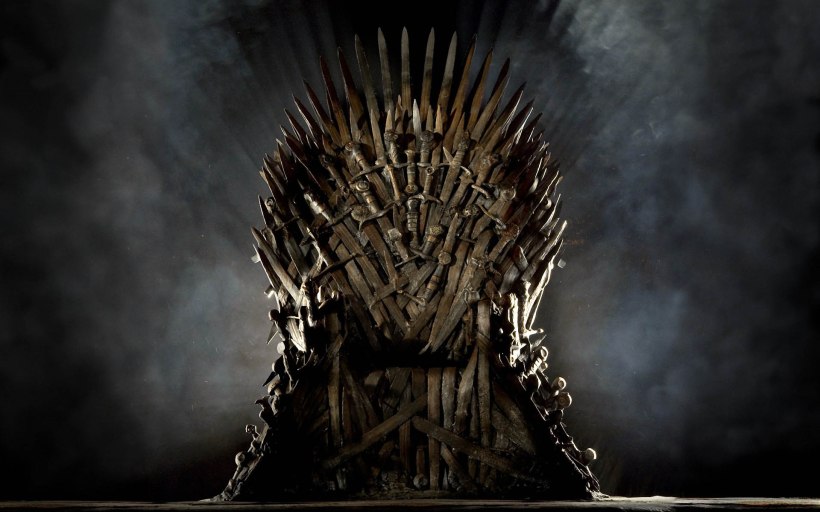Jesus said two of the three following things. See if you can tell which one doesn’t belong: “If your eye causes you to sin, pluck it out.” “Anyone who looks at a woman with lust has already committed adultery with her in his heart.” “Fear not to watch people have gratuitous amounts of violent sex and graphically kill each other, for I say unto you, it is artistic.”
I refuse to apologize for the following rant.
Lately I’ve seen a few pieces critiquing Game of Thrones. One from The Week had a particularly good presentation of the reality of this show’s content. If you are unfamiliar with the show, first of all, what rock have you been hiding under? Second of all, can I join you? It sounds nice there – a place where you don’t know that a show replete with sadistic wizard porn and comically graphic violence is touted by countless critics as so “meaningful” and “artistic” that to date it has received over 600 nominations for major awards and has won over 200 of them. This includes winning 38 Emmy’s – the most ever.
It is perhaps not that shocking that it’s a critically acclaimed show. What is shocking, or at least should be, is that so many Catholics try to make a defense for it, which is the sin of scandal – and I mean scandal in the sense of “leading the little ones to sin,” not in the sense of offending sensibilities. After running across the articles mentioned above, I did some research. To my dismay, there is an entire tradition of Catholic GoT apologia and artistic intrigue.
Good riddance.
“Game of Thrones isn’t really pornographic.” Except for all the scenes which remove “real or simulated sexual acts from the intimacy of the partners, in order to display them deliberately to third parties.” (CCC #2354) The big counter is, no, pornography necessarily means the creator has an intention of “manipulation towards the end of sexual arousal.” Never mind that one of the main actors thinks its pornographic. Never mind the tangential nature of many of these scenes to the plot. Never mind the disproportion of graphic depictions of women compared to men. (I could go on, but I won’t.) What really matters is that it’s obvious that such a high percentage of viewers are going to use these images for self-abuse and lustful thoughts, and the producers of the show know this and definitely exploit it for viewership, that it boggles the mind that someone would try to defend this garbage as – wait for it – “intended to elicit [a] heightened awareness of humanity.” I have a word for that so-called “heightened awareness” – lust.
“Game of Thrones presents a meaningful search for virtue.” Why is this, you ask? Because some characters occasionally do something self-sacrificial or heroic, and one character reads a lot. The author admits, however, “Unfortunately we don’t get a lot of learned intellectual discussion in Game of Thrones. . .” What we do get a lot of is rape, torture, incest, and meaningless nudity. If these characters are searching for virtue, they need to search harder. The producers of the show, however, are definitely searching for viewership to make money and advance their careers. Guess what sells? Vice, and one vice in particular.
“Game of Thrones has good writing.” Let’s say that it does – which is disputable. So what? Maybe you like the writing in the Koran or the Communist Manifesto or the latest Dawkins screed. Does that mean it’s good for your soul? Would you go to the strip club because you like the music they play, even though you are imperiling your soul? That’s what this is like.
Sources could be multiplied, but why bother? I should add, however, that there are loads of people deeply enamored by the fact that one of the religions in the show is based off Catholicism. Great, just what we need. Are you really of the opinion that Our Lord thinks that’s “cool”?
I can hear the voices calling out… “But it IS artistic! There IS good writing! You just don’t GET IT! Look at the way – ”
I know. I’m a filmmaker. I get that there are some neat artistic devices, and I can appreciate that. But again, to say that justifies everything else is ludicrous. It would be like saying that since Jack the Ripper had style, it would have been worth letting him run free. As I’ve argued before, otherwise good art can be ruined by distractions.
“But there’s violence and sex in the Old Testa-”
And that’s written down, it’s not dwelt on, it’s true, and it’s relevant to our salvation history and therefore to understanding the Life of Our Lord and the meaning of His Church. So no, that does not work.
“But it’s not necessarily a sin to -”
And walking on the edge of a cliff is not the same as falling off. But sheep walk off cliffs. We are spiritual sheep, and watching a show like this is a spiritual cliff of dizzying heights. Pretending that we can relive the state of Eden before the Fall is nothing short of a delusional rejection of the reality of our wildly disordered concupiscence. Where is our shame? The Lord and His saints are with us while we watch these things, which should disgust us. Shame is exactly that virtue which alerts us to the threat or reality of such self-debasement.
Game of Thrones is popular because so many people got bored with less “interesting” programming. It could only sell after the old stuff wasn’t fun enough. This is how drugs work, by the way… Where does this downward spiral end? Red rooms? One can only speculate, but it will not be pretty. It will be shameful, and we might not even have the integrity to admit it.
Post by: Eamonn Clark
Main image: iron throne from Game of Thrones (taken from vox.com)

